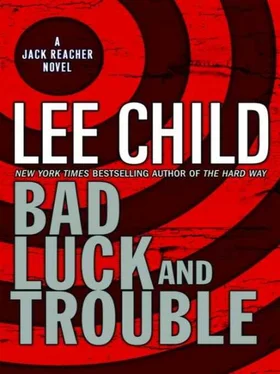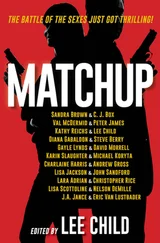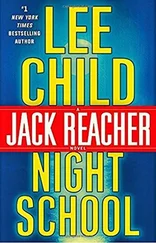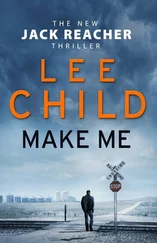Same kind of injury.
“Any problems?” he asked.
“Easy,” she said. “And quieter than you. I heard that head butt all the way over here.”
They bumped fists in the dark, the old ritual, about as much physical contact as she liked to permit.
“Lamaison thinks we’re on the outside looking in,” Reacher said. “He’s trying to scam us with a deal. If we surrender they’ll lock us all up for a week and then let us go when the heat dies down.”
“Like we’d believe that.”
“One of my guys had Dave’s knuckleduster.”
“That’s not a good sign.”
“They’re OK so far. I asked for a proof of life. Personal questions. Dixon says she was with the 53rd MP and O’Donnell says he was with the 131st.”
“That’s bullshit. There was no 53rd MP. And Dave was posted to the 110th straight out of Officer Candidate School.”
“They’re talking to us,” Reacher said. “Fifty-three is a prime number. Karla knew I’d pick up on that.”
“So?”
“Five and three make eight. She’s telling us there are eight hostiles.”
“Four left, then. Lennox, Parker, and Lamaison. Plus one. Who’s the fourth?”
“That’s Dave’s message. He’s a words guy. One-three-one. Thirteenth letter of the alphabet, first letter of the alphabet.”
“ M and A ,” Neagley said.
“Mauney,” Reacher said. “Curtis Mauney is here.”
“Excellent,” Neagley said. “Saves hunting him down later.”
They bumped fists again. Then cell phones started to ring. Loud and piercing and insistent. Two of them, different tones, unsynchronized. One each in the dead guys’ pockets. Reacher had no doubt at all the same thing was happening fifty yards away. Two more dead guys, two more pockets, two more ringing phones. A conference call. Lamaison was touching base with his foot patrol.
Something unpredictable.
The phones rang six times each and stopped. Silence came back.
“What would you do now?” Reacher asked. “If you were Lamaison?”
Neagley said, “I’d get guys in those Chryslers and turn the head-lights on bright and fix myself a little motor patrol. I’d run us down in less than a minute.”
Reacher nodded. Against a man on foot, the lot felt big. Against a car, it would feel small. Against more than one car it would feel tiny. In the dark it felt safe. With xenon beams blazing away it would feel like a goldfish bowl. He pictured cars bouncing over the rough ground, pictured himself trapped in their lights, darting left, darting right, shading his eyes, one car chasing, two cars converging.
He glanced at the fence.
“Correct,” Neagley said. “The fence keeps us in just as well as it kept us out. We’re two balls on a pool table and someone’s about to turn on the lights and pick up a cue.”
“What are they going to do if they don’t find us?”
“How are they not going to find us?”
“Suppose.”
Neagley shrugged and said, “They’re going to assume we got out somehow.”
“And then?”
“They’re going to panic.”
“How?”
“They’re going to kill Karla and Dave and hunker down.”
Reacher nodded.
“That’s my guess, too,” he said.
He got up and ran. Neagley followed.
Reacher ran straight for the helicopter. It was sixty yards away, large and white and luminous in the city’s nighttime glow. Neagley jogged at his side, patiently. Reacher was no kind of a sprinter. He was slow and heavy. And he had stuff bouncing around in his pockets. Any college athlete would have done the sixty yards in six or seven seconds. Neagley would have done it in eight. Reacher took closer to fifteen. But he got there in the end. He got there just as the main building’s door burst open and light and men spilled out. He dodged left and kept the chopper between him and them. Neagley crowded in at his elbow. Three guys were heading for the parking lot, fast and urgent. Parker and Lennox. And Lamaison. They were all hurrying. For every yard they covered, Reacher and Neagley moved a corresponding inch around the Bell, clockwise, touching its belly lightly with their fingertips, using its bulk as a shield. It was cold and dewed over with night mist, like a car parked on the street. It felt slimy. It smelled of oil and kerosene.
Thirty yards away three Chryslers started up. Three V-8 engines, suddenly loud in the stillness. Three transmissions slammed into gear. Three pairs of headlights flicked on. They were unbelievably bright in the darkness. They were crisp, focused, hard-edged, and superwhite. Then they got worse. One by one they switched to high beam. New lenses lit up. Huge cones of dazzling light swayed and bounced as the cars began to move. Reacher and Neagley slid around the Bell’s long pointed nose and hugged the other flank. The cars separated like a shell burst and accelerated and headed off in random changing directions.
Within ten seconds they had found all four dead guys.
The cars slewed to a stop at the two sites fifty yards apart. One car where Neagley had been, two where Reacher had been. Their lights went still and threw long grotesque quadruple shadows off the four humped shapes. Three distant figures ran around, flashing instantly from extreme brightness into total darkness as they moved through the beams.
“We can’t stay here,” Neagley said. “They’re going to come back this way and light us up like we’re on stage at the Hollywood Bowl.”
“How long have we got?”
“They’re going to check the fence pretty thoroughly. Four minutes, maybe.”
“Start counting,” Reacher said. He pushed off the helicopter’s flank and ran for the main building. Forty yards, ten seconds. The door had been left ajar. Lights had been left on. Reacher paused. Then he walked straight in, very quietly, with his hand on his Glock in his pocket. Saw nobody inside. The place seemed to be deserted. There were small walled-off offices on the right and a big open-plan work area on the left, behind a floor-to-ceiling plate glass screen. The work area had long laboratory benches and bright lights and complex extraction ducts on the ceiling to control dust and a grounded metal grid on the floor to control static electricity. A sliding door in the screen was open. The air coming out smelled of warm silicon boards. Like a brand-new TV.
The offices on the right were little more than eight-by-eight cubicles with head-high walls and doors. One was labeled Edward Dean . The development engineer. Now the quality control guy. The next door was labeled Margaret Berenson . The dragon lady. A remote facility, Reacher guessed, for when she had to deal with Human Resources issues without dragging assembly personnel all the way south to the glass cube in East LA. The next door was Tony Swan’s. Same principle. Two centers, two offices.
The next door was Allen Lamaison’s.
It was standing open.
Reacher took a breath. Took his Glock out of his pocket. Stepped into the doorway. Stood still. Saw an eight-by-eight cube, desk, chair, fabric walls, phones, file cabinets, stacks of papers, memos.
Nothing unusual or out of place.
Except for Curtis Mauney behind the desk.
And a suitcase standing against a wall.
Neagley stepped into the room.
“Sixty seconds gone,” she said.
Mauney just sat there at the desk, immobile. Some kind of blank resignation on his face, like a man with a bad diagnosis waiting for a second opinion he knows will be no better. His hands were empty. They were curled together on the desktop like mating crabs.
“Lamaison was my partner,” he said, like an excuse.
Reacher nodded.
“Loyalty,” he said. “It’s a bitch, ain’t it?”
Читать дальше












